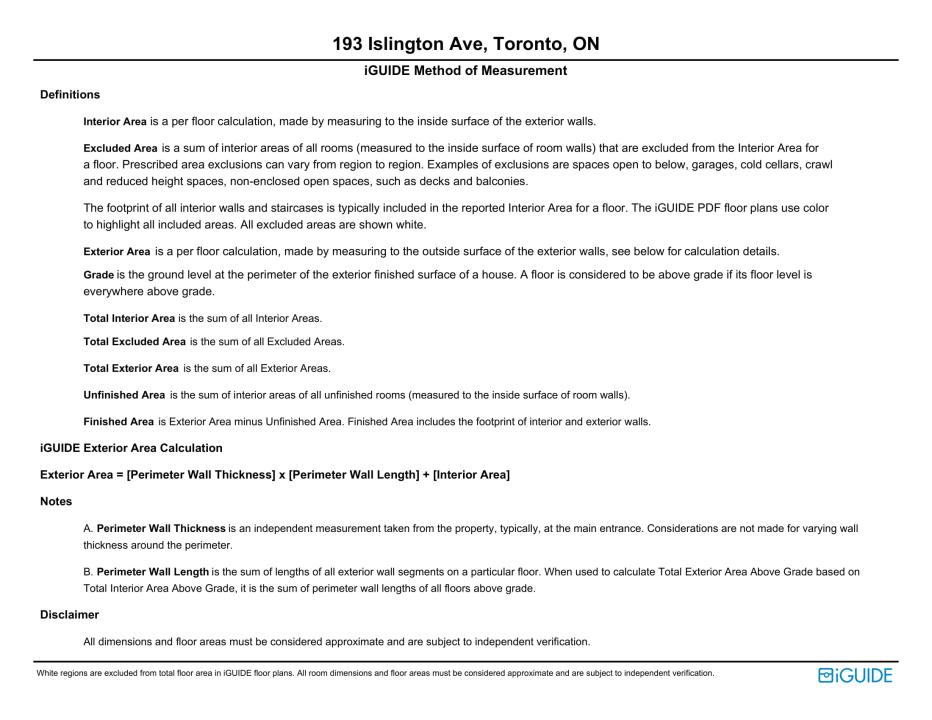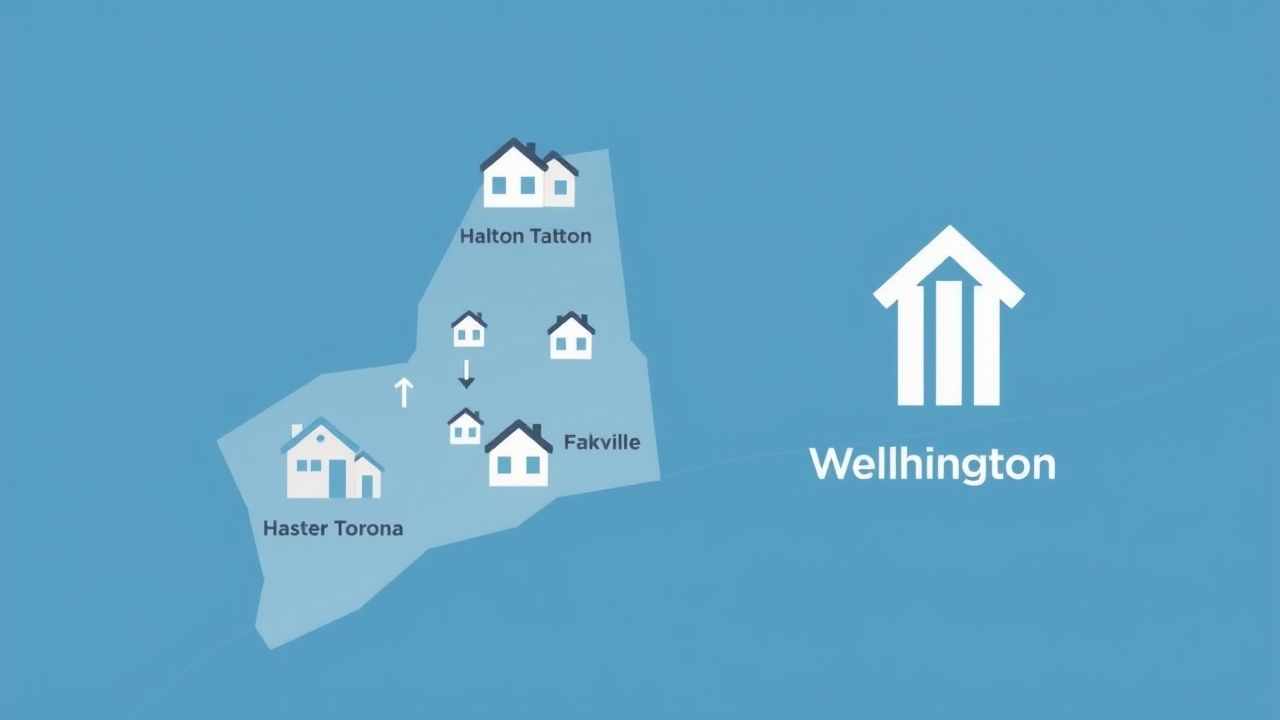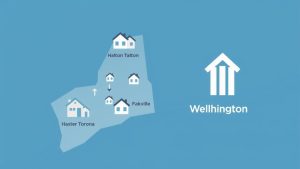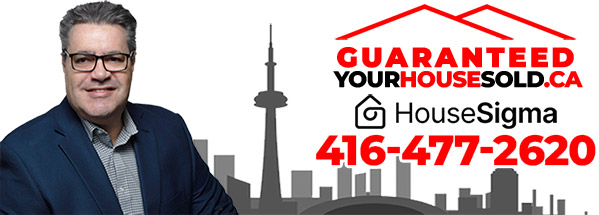Are you trying to buy or sell a home in the GTA and feeling totally lost?
This guide cuts through the noise. Forget confusing reports. This is your simple plan to win in the crazy Greater Toronto Area real estate market. Whether you’re looking in Georgetown, Milton, Guelph, Acton, Oakville, Burlington, or anywhere in between, this is for you.
We break down buying and selling into easy steps. No jargon. Just straight talk. Let’s get started.
Understanding the GTA Market Madness (2024-2025)
First things first. What is actually happening out there? Is it a good time to buy? Or sell? It’s confusing.
The market changes fast. One month things look up, the next they look down. Knowing the basics helps you make smarter moves.
What the Numbers Mean (Early 2025)
Numbers tell a story. Here’s a simple look at early 2025 in the GTA:
- Average Sold Price: Around $1,084,547. This was slightly down compared to the year before (about 2.2%). But it was up a bit from the month before (about 4.2%). See? Confusing already.
- Benchmark Home Price: This is like a standard price for a typical home. It was $1,073,900. Also down a little from last year (1.8%).
- Homes Sold: Fewer homes sold compared to the year before (down 28%). But slightly more than the previous month.
- Homes for Sale (Listings): Way more homes were for sale compared to last year (up 76%!). Lots of choices for buyers.
Is it a Buyer’s or Seller’s Market?
Right now, it leans towards a buyer’s market. What does that mean for you?
- If you’re buying: You have more options. More homes listed means less pressure to decide fast. You might have more room to negotiate the price down. Sellers might be more willing to agree to your conditions (like getting a home inspection).
- If you’re selling: You have more competition. More houses listed means you need to price your home right. It might take longer to sell. Your home needs to look its best to stand out.
The Sales-to-New-Listings Ratio (SNLR) helps show this. It compares how many homes sold versus how many new ones came up for sale. In early 2025, the SNLR was around 33%. Generally, below 40% means it’s a buyer’s market.
Local Buzz: Georgetown, Milton, Guelph, Acton, Oakville, Burlington
The GTA is huge. What happens in downtown Toronto is different from Guelph or Acton. You need to look local.
- Milton: Known for growth. Families like it here. Prices can be competitive. Check recent sales data for specific neighborhoods. Milton saw average prices dip slightly year-over-year in some reports but remains popular. New listings have increased, giving buyers more choice than before.
- Georgetown (Halton Hills): Offers a small-town feel but is still connected. Look at how prices compare for detached homes versus townhouses. Recent trends show stable demand, but like elsewhere, more homes are available.
- Guelph: University city vibe plus employment hubs. The market here has its own rhythm. Check Guelph & District Association of Realtors for local stats. Price changes might be less dramatic than in areas closer to Toronto. Steady interest from buyers continues, but inventory is up.
- Acton (Halton Hills): Smaller community, often more affordable options. Track local sales closely. It might be more sensitive to overall market shifts. More listings provide opportunities for buyers seeking value.
- Oakville: Often higher-end homes. Prices here are usually higher than the GTA average. Even in a buyer’s market, desirable properties sell well. Look at specific neighborhood trends (e.g., Bronte vs. Glen Abbey). While average prices saw minor adjustments, the luxury segment has its own dynamics.
- Burlington: Lakeside living, good connections. Similar to Oakville, prices tend to be higher. Check stats from the Realtors Association of Hamilton-Burlington (RAHB). Burlington saw a moderate increase in listings, offering more selection for buyers.
How to Find Home Price Trends
Knowing the overall market is good. Knowing your specific area is better. How do you find this info?
- Local Real Estate Boards: TRREB (Toronto Regional Real Estate Board), RAHB (Hamilton-Burlington), Guelph board. They publish monthly reports. Look for stats sections.
- Real Estate Websites: Many sites (like Zolo, HouseSigma, Wowa.ca) show recent sales data. Some let you filter by neighborhood.
- Ask a Local Agent: Good local agents live and breathe this stuff. They know the streets, not just the stats.
Expert Insight: “Don’t just look at the GTA average price,” advises Sarah Chen, a real estate agent specializing in Halton Region. “Your specific neighborhood in Oakville or Milton could be behaving very differently. Dig into recent comparable sales – that’s where the real story is.”
Finding the Money: Mortgages and More
Buying a home costs money. Usually, a lot of money. Most people need a mortgage.
Getting your finances sorted before you look at homes is key. It saves you time and stress.
Mortgage Pre-Approval: Your First Step
Think of pre-approval as homework. You talk to a bank or mortgage broker. They look at your income, your debts, your credit score. They tell you how much they might lend you and what interest rate you might get.
Why do this first?
- Know Your Budget: You won’t waste time looking at homes you can’t afford.
- Shows Sellers You’re Serious: In a competitive situation, sellers prefer offers from pre-approved buyers.
- Locks in a Rate (Sometimes): Some pre-approvals hold an interest rate for you for a period (like 90 or 120 days). If rates go up, you’re protected for that time.
Go talk to a mortgage broker. They work with many lenders (banks, credit unions, etc.) and can shop around for the best deal for you. Banks only offer their own products.
Interest Rates: The Big Deal
Interest rates change. They went up a lot recently. Now, they seem to be stabilizing or maybe coming down slowly (as seen with Bank of Canada cuts mentioned in market reports).
Even a small change in the interest rate makes a big difference in your monthly payment and the total interest you pay over years.
Example: A $500,000 mortgage at 5% over 25 years has a monthly payment of about $2,908. At 6%, it’s about $3,199. That’s over $300 more each month.
Keep an eye on rates. What you get pre-approved for today might change by the time you buy.
Down Payment: How Much Do You Need?
This is the chunk of money you pay upfront. The minimum depends on the home price:
- Price up to $500,000: Minimum 5% down.
- Price $500,001 to $1 million: 5% on the first $500k, plus 10% on the part above $500k.
- Price over $1 million: Minimum 20% down.
If your down payment is less than 20%, you must pay for mortgage default insurance (like CMHC insurance). This protects the lender if you can’t pay. It adds to your cost.
Saving a bigger down payment means:
- Smaller mortgage needed.
- Lower monthly payments.
- Maybe avoiding default insurance.
First-Time Home Buyer Programs Ontario
Are you buying your first place? Look for help!
- Land Transfer Tax Rebates: Both Ontario and the City of Toronto offer rebates on land transfer tax for first-time buyers. This can save you thousands. Check the government websites for current amounts and rules. Ontario offers up to $4,000. Toronto offers up to $4,475.
- First Home Savings Account (FHSA): This is a federal account. You can save money tax-free (like an RRSP) and withdraw it tax-free (like a TFSA) to buy your first home. It’s a great tool.
- RRSP Home Buyers’ Plan (HBP): You can borrow from your RRSPs (up to a certain limit per person) tax-free for a down payment. You have to pay it back over 15 years.
Check eligibility rules carefully for all programs.
Hidden Costs: Don’t Forget These!
Your mortgage and down payment are the big ones. But there are other costs. Budget for them!
- Land Transfer Tax: Paid to the province (and City of Toronto if applicable) when you buy. Can be hefty.
- Legal Fees: You need a lawyer to handle the closing. Fees vary.
- Home Inspection: Strongly recommended. Costs maybe $400-$600.
- Appraisal Fee: The lender might require an appraisal to confirm the home’s value. Sometimes they cover it, sometimes you pay.
- Title Insurance: Protects you against ownership issues. Usually required by the lender.
- Moving Costs: Movers, truck rental, boxes, etc.
- Utility Hookups: Setting up hydro, gas, internet.
- Immediate Repairs/Renovations: Does the place need paint? New floors?
Plan for these closing costs. They can add up to 1.5% to 4% of the home’s purchase price.
Buying Your Home in the GTA: The Hunt and The Offer
You’ve got your money sorted. Now the fun part: finding your place.
Finding the Right Agent
A good real estate agent is your guide. They help you find homes, arrange viewings, understand market values, and negotiate offers.
How to pick one?
- Get Referrals: Ask friends, family, colleagues who recently bought or sold in your target area.
- Look for Local Experts: An agent who knows Milton well is better for buying in Milton than someone based only in downtown Toronto.
- Interview Them: Talk to 2-3 agents. Ask about their experience, their strategy for finding homes, how they communicate. Do you click with them?
- Check Reviews: Look online for testimonials or reviews.
Don’t just go with the first agent you meet. Find someone you trust.
Where to Look for Homes
Your agent will set you up with listings. But you can look too:
- Realtor.ca: The official source for MLS listings across Canada.
- Real Estate Company Websites: Most brokerages have websites with listings.
- Online Portals: Sites like Zolo, HouseSigma, Bungol show listings, sometimes with extra data like past sale prices.
- Drive Around: See a ‘For Sale’ sign in a neighborhood you like? Tell your agent.
What to Look For During Showings
Don’t just look at the pretty kitchen.
- Big Stuff: Roof condition? Furnace age? Windows look old? Electrical panel outdated? Foundation cracks? Water stains?
- Layout: Does the flow work for you? Enough bedrooms/bathrooms? Good storage?
- Neighborhood: What’s nearby? Schools? Parks? Transit? Traffic noise? Check it out at different times of day.
- Future Potential: Can you renovate later if needed? Is the area improving?
- Your Gut Feeling: Does it feel like home?
Take notes and photos at each viewing. They start to blend together after a while.
Understanding Property Value
How much is a house actually worth? That’s the million-dollar question (sometimes literally!).
- Average House Price by Neighborhood: This gives a general idea. Your agent can provide reports showing average prices for different types of homes in specific areas of Guelph or Oakville.
- Median Home Value by City: The median price is the middle price – half sold for more, half for less. It’s often a better indicator than the average, as super-expensive sales don’t skew it as much. You can find median home price data in local real estate board reports.
- Comparable Sales (‘Comps’): This is key. Look at what similar homes, in the same area, have sold for recently. Your agent pulls these comps. This is the best way to estimate a specific home’s market value.
- Property Value Lookup Tool: Some websites offer automated estimates. Use these as a starting point only. They don’t know the home’s condition or unique features. They provide home value estimates by area but are not precise.
Making an Offer
You found the one! Now you make an offer.
Your offer includes:
- Price: What you’re willing to pay.
- Deposit: Shows you’re serious. Held in trust. Part of your down payment if the deal closes.
- Conditions: These protect you. Common ones are:
- Financing Condition: You need time to confirm your mortgage approval.
- Home Inspection Condition: You need time to get a professional inspection. If big problems are found, you might renegotiate or walk away.
- Sale of Your Current Home Condition: If you need to sell your place first.
- Status Certificate Review (for Condos): Your lawyer needs to review the condo corporation’s health.
- Closing Date: The day you officially take ownership.
Negotiation
The seller can accept your offer, reject it, or make a counter-offer (change the price, date, or conditions).
You can then accept their counter, make your own counter, or walk away.
In a buyer’s market (like early 2025 seemed to be), you have more power to negotiate price and keep conditions.
In a seller’s market (hotter market), you might need to offer more, maybe even remove conditions (this is risky!).
Listen to your agent‘s advice during negotiations. They do this every day.

Selling Your GTA Home: Pricing, Prep, and Profit
Ready to sell your place in Georgetown or Burlington? Here’s how to handle it.
Finding the Right Listing Agent
Like finding a buyer’s agent, but you want someone skilled at selling in your area.
Ask potential listing agents:
- How will you market my home (photos, online, open houses)?
- What’s your strategy for pricing?
- What’s your commission? (Usually a percentage of the sale price, split with the buyer’s agent. It’s negotiable).
- How will you help me prepare my home?
Pricing Your Home: The Crucial Step
Price it too high, it sits unsold. Price it too low, you lose money.
Your agent will do a Comparative Market Analysis (CMA). This looks at:
- Recent sales of similar homes nearby (comps).
- Current listings (your competition).
- Expired listings (homes that didn’t sell, often overpriced).
- Current market conditions (real estate market median price trends).
Be realistic. The price you want isn’t always the price the market will pay. Especially in a buyer’s market.
Getting Your Home Ready (Staging)
First impressions matter. A lot.
- Declutter: Get rid of stuff. Everywhere. Closets, counters, shelves. Rent a storage unit if needed.
- Depersonalize: Remove family photos, personal collections. Buyers need to imagine themselves living there.
- Clean: Deep clean everything. Windows, floors, bathrooms, kitchen. Make it sparkle.
- Repairs: Fix obvious problems. Leaky faucet, broken tile, hole in the wall.
- Paint: Neutral colors appeal to more people. Fresh paint makes a huge difference.
- Curb Appeal: Tidy the lawn, weed the garden, paint the front door. Make people want to come inside.
Your agent might suggest professional staging. This costs money but can often lead to a faster sale at a better price.
Marketing Your Home
Your agent handles this, but know what to expect:
- Professional Photos/Video: Essential. Phone snaps won’t cut it.
- Online Listing: MLS (Realtor.ca) and other popular sites.
- ‘For Sale’ Sign: Still works!
- Open Houses/Showings: Be prepared to leave your house clean and tidy for viewings.
Receiving and Negotiating Offers
Your agent presents all offers to you.
Look at:
- Price: Obviously important.
- Conditions: Are there many? Are they reasonable? Fewer conditions mean a firmer deal.
- Deposit Amount: A larger deposit can show buyer commitment.
- Closing Date: Does it work for you?
You can accept, reject, or counter-offer. Your agent guides you through the negotiation.
Selling Your House Fast Burlington (or anywhere else)
Need to sell quickly?
- Price it competitively: Maybe slightly below market value to attract fast offers.
- Be flexible on closing date.
- Ensure it shows perfectly: Clean, staged, ready.
- Offer incentives? Maybe cover some closing costs (less common).
Talk to your agent about strategies if speed is your priority.
The Nitty-Gritty: Legal, Inspections, Closing
You’ve got a deal! But you’re not done yet.
Home Inspection (If you’re buying)
If your offer included a home inspection condition, now’s the time.
A qualified inspector checks the home’s major systems: structure, roof, electrical, plumbing, heating/cooling.
They give you a detailed report. It might find issues you didn’t see.
- Minor Issues: Usually expected. You handle these after moving in.
- Major Issues: Big problems (like needing a new roof soon, or foundation issues). You might try to renegotiate the price with the seller, ask them to fix it before closing, or if the issue is too big, you might use the condition to walk away from the deal.
Don’t skip the inspection, even on a new-looking home. It’s worth the cost for peace of mind.
Legal Work
Both buyer and seller need a real estate lawyer.
- Buyer’s Lawyer: Reviews the offer, searches the property title, arranges title insurance, checks property taxes/utility bills, tells you the final amount needed for closing, registers the deed and mortgage, gives you the keys.
- Seller’s Lawyer: Reviews the offer, prepares the deed transfer documents, confirms payout amounts for any existing mortgage, receives funds from the buyer’s lawyer, pays off debts, gives the rest to the seller.
Find a lawyer who specializes in real estate.
Condo Status Certificate (If buying a condo)
If you buy a condo, your offer should have a condition to review the Status Certificate.
This is a package of documents from the condo corporation. Your lawyer reviews it. It shows:
- The condo’s financial health (budget, reserve fund).
- Any planned special assessments (extra fees for big repairs).
- Rules and regulations.
- Any lawsuits involving the corporation.
If the review shows major problems, you might withdraw your offer.
Closing Day
This is the day the ownership officially transfers.
- Lawyers exchange documents and money.
- The deed and mortgage are registered.
- You get the keys (usually late afternoon).
Make sure you’ve arranged:
- Home insurance (starts on closing day).
- Transferring utilities to your name.
- Booking movers.
Common Issues Before Closing
Sometimes things pop up:
- An appliance included in the deal breaks.
- The seller didn’t clean properly or left junk behind.
- There’s damage from when the seller moved out.
Your lawyer helps resolve these. Often involves holding back some money until the issue is fixed.
Moving In / Moving Out: Making it Smooth
Moving is stressful. Planning helps.
Tips for Buyers Moving In:
- Book Movers Early: Especially during busy seasons (spring, summer, end of month).
- Change Your Address: Post office, banks, driver’s license, health card, subscriptions.
- Set Up Utilities: Arrange for hydro, gas, water, internet to start on closing day.
- Clean Before Unpacking: Easier to clean empty rooms.
- Change the Locks: You don’t know who had keys before.
- Locate Shut-Off Valves: Find the main water shut-off and electrical panel right away.
Tips for Sellers Moving Out:
- Cancel/Transfer Utilities: Arrange for final readings.
- Leave the Place Clean: Broom-swept condition is usually expected. Be nice!
- Leave Keys/Remotes: Garage door openers, mailbox keys, etc. Usually left for the new owner via the lawyers.
- Forward Your Mail.
- Take Final Meter Readings: Just in case.
GTA Real Estate FAQ: Your Questions Answered
Q: How do I find the median home price for Guelph specifically?
A: Check the monthly reports from the Guelph & District Association of Realtors (GDAR). Real estate websites that track local data (like HouseSigma or Zolo) might also show median prices if you filter for Guelph. Your local real estate agent can provide the most current median price data.
Q: Is using a property value lookup tool accurate for my home in Milton?
A: Those online tools give a rough estimate based on general data. They don’t know your home’s specific condition, upgrades, or unique features. Use it as a starting point, but rely on a Comparative Market Analysis (CMA) from a local real estate agent for a more accurate valuation for selling your Milton home.
Q: What’s the difference between average house price by neighborhood and median home value by city?
A: Average price is the total value of all sales divided by the number of sales. It can be skewed by very high or very low sales. Median price is the middle value – half the homes sold for more, half for less. Median is often better to understand the typical market price. You need neighborhood data (average or median) for specific areas within a city, as prices vary greatly even street by street.
Q: How can I find home price trends for Acton over the last year?
A: Look at reports from the Toronto Regional Real Estate Board (TRREB), which covers Acton (part of Halton Hills). Check historical data sections. Local real estate agents specializing in Acton or Halton Hills will have detailed trend data showing how prices have changed month-over-month and year-over-year.
Q: Are there specific first-time home buyer programs for Oakville or Burlington?
A: Most programs are provincial (Ontario Land Transfer Tax Rebate) or federal (FHSA, HBP). There usually aren’t extra programs specific only to Oakville or Burlington, but residents there are eligible for the provincial/federal ones. Always check the official government websites or ask your mortgage broker for the latest details.
Q: Is it better to buy a detached home or a condo apartment in the current GTA market?
A: It depends on your budget, lifestyle, and goals. Detached homes generally increased slightly in price year-over-year (early 2025), while condos decreased slightly. Condos are more affordable but come with monthly fees. Detached offer more space and land. Consider maintenance, location, and long-term plans. Talk to your agent about the pros and cons for your specific situation.
Expert Insight: “Affordability is still the biggest hurdle,” notes David Miller, a mortgage specialist in Mississauga. “Even with slightly lower prices on some property types, higher interest rates impact buying power. Get pre-approved early to understand exactly what you can afford, including condo fees if you’re considering an apartment.”
Buying or selling a home in the GTA is a big deal. It takes planning and good information. This guide gives you the basics for areas like Georgetown, Milton, Guelph, Acton, Oakville, and Burlington.
Remember the market keeps changing. Stay updated. Work with professionals you trust – a good local agent, a mortgage broker, a lawyer.
Ready to take the next step? Thinking about buying and want to guarantee you save money? Or maybe you need help selling? Get the information and support you need to make smart moves in this market.
[Link to your Contact Page or Lead Form – e.g., Click here to talk to an expert about your next move.]
[Link to RECO – e.g., Learn more about working with a real estate agent at RECO.on.ca]
[Link to local board if desired – e.g., Find local stats at TRREB.ca]






















